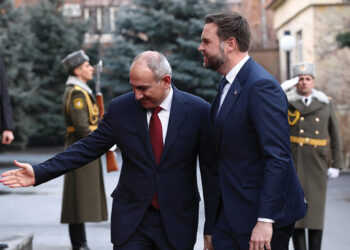In a remarkable display of solidarity with the arts sector, and deeply shaken by the recent political protests, TBC Bank and the ticketing platform TKT.ge have united to breathe life into Georgia’s cultural landscape. TBC announced its intention to purchase tickets for all cultural events planned before January 1, 2025, that were canceled due to ongoing disruptions. Their statement, “All tickets sold out: in theaters, opera houses, and the conservatory,” reflects a profound gesture toward supporting struggling cultural institutions.
Cultural Stagnation Amid Political Turmoil
The crisis stems from the political fallout of Prime Minister Irakli Kobakhidze’s decision to freeze EU membership talks on November 28, triggering widespread protests. Cultural events across Georgia were canceled as institutions and artists joined the national outcry, leaving the arts sector in an unprecedented state of limbo. This cultural solidarity aligns with the Georgian tradition of intertwining art and political activism—a legacy forged during Soviet rule and revived during the country’s independence movements.
Meanwhile, the initiative by TKT.ge builds on earlier efforts by Biletebi, another ticketing platform that invited users to purchase tickets for canceled events as a symbolic act of support. However, TBC’s large-scale intervention signifies a transformative shift, suggesting that corporate responsibility can go beyond mere financial backing to actively reshape the relationship between culture, economics, and civic engagement.
Reimagining Solidarity Through Culture
From a sociological perspective, this phenomenon highlights the role of cultural institutions as spaces of collective identity and solidarity. By purchasing tickets, TBC doesn’t merely save theaters or concert halls from financial ruin; it reinforces the public’s connection to culture as a shared heritage. Sociologist Émile Durkheim’s theory of “collective effervescence” becomes pertinent here—through communal experiences like theater or music, societies renew their moral and social fabric.
In a nation grappling with political uncertainty, TBC and TKT.ge’s initiative symbolizes the restoration of a fractured social order. By ensuring the future of cultural spaces, these entities are preserving the arenas where Georgian identity, history, and aspirations are most vividly expressed.
Art as Resistance
Philosophically, this partnership echoes the writings of Hannah Arendt, who argued that art’s permanence offers a form of resistance against the transience of political upheavals. Georgian cultural institutions, through their alignment with protests, affirm art’s capacity to challenge the status quo while also serving as a sanctuary for reflection and hope.
This initiative also touches on existential questions about the role of art in times of crisis. Does art exist solely for aesthetic pleasure, or does it possess an ethical responsibility to respond to societal issues? The Georgian response seems to favor the latter, demonstrating that art can both critique and heal, standing as a bulwark against political and social despair.
The Art of Corporate Responsibility
On an economic level, TBC’s intervention underscores the evolving role of corporate entities in cultural life. Traditionally seen as patrons or sponsors, corporations like TBC are now stepping into the role of cultural mediators, directly influencing the survival and accessibility of the arts.
This move also raises questions about the commodification of solidarity. While the initiative is undoubtedly altruistic, it also generates significant goodwill for TBC Bank, positioning it as a champion of civic values. This duality—a blend of ethical commitment and strategic branding—represents a new model of corporate responsibility in the 21st century.
The Broader Cultural Impact
The collaboration between TBC and TKT.ge extends beyond immediate financial relief. It introduces a new narrative about the interdependence of cultural institutions, corporate entities, and civil society. This model could serve as a blueprint for other nations grappling with the intersection of art, politics, and economics.
Moreover, the symbolic act of “selling out” tickets for canceled events transforms a moment of cultural loss into one of resilience. It reaffirms the value of artistic labor, reminding society that even canceled performances hold intrinsic worth as expressions of human creativity and solidarity.
A Testament to Georgian Resilience
Georgia’s cultural sector has long been a mirror of the nation’s struggles and aspirations, and the partnership between TBC Bank and TKT.ge adds a new chapter to this storied history. By stepping in during a time of profound uncertainty, they not only ensure the survival of theaters and concert halls but also uphold the cultural soul of the nation.
In the words of Georgian writer Nodar Dumbadze, “Art is the conscience of the nation.” In this moment, that conscience is alive and thriving, reminding Georgians—and the world—that culture is not a luxury but a necessity, especially in times of crisis.
By Ivan Nechaev














